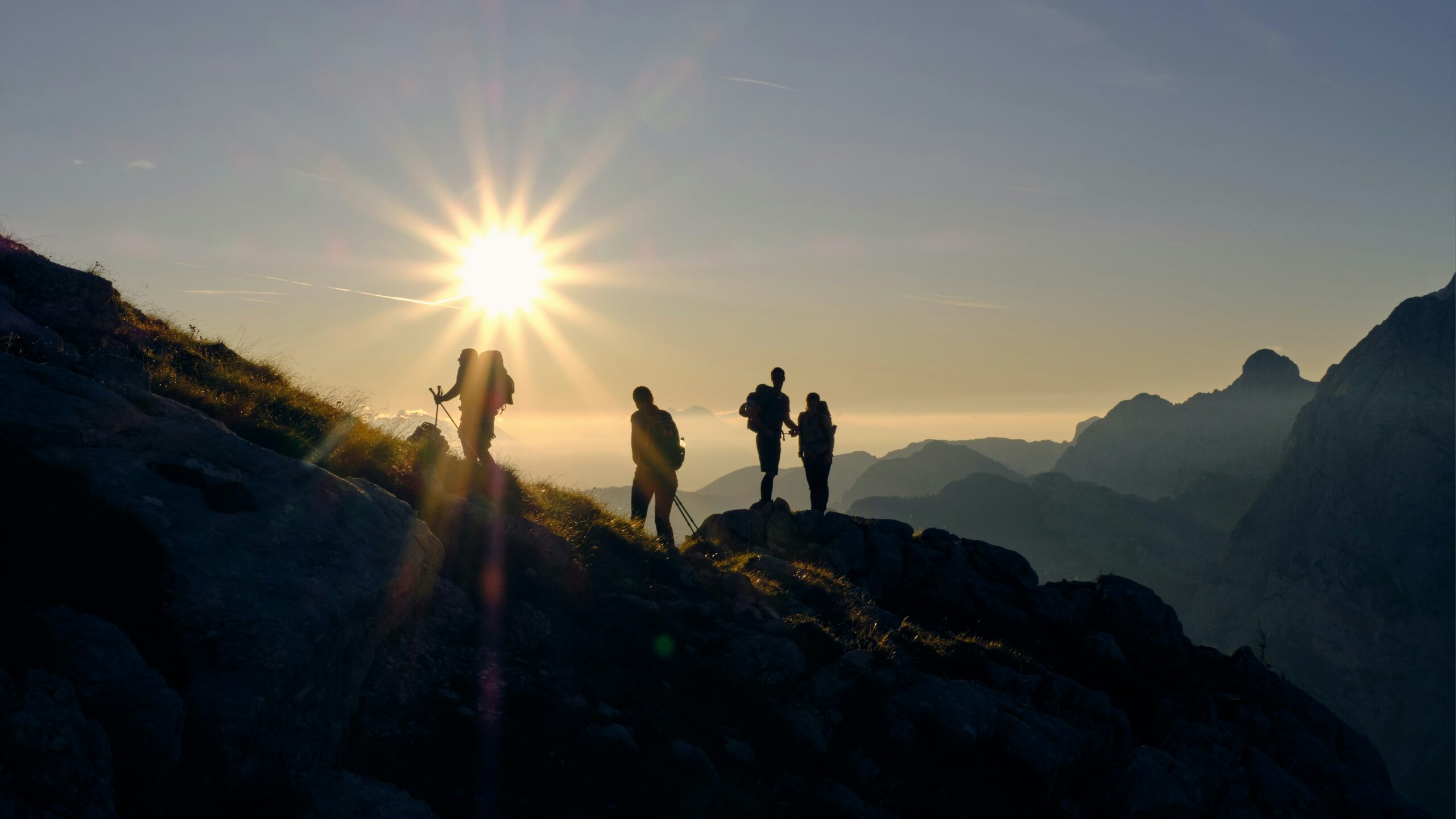Other Relevant Seminars
A Collection of IHOPE relevant seminars from other networks that can be joined virtually or watched via recording.
Climate and Environmental History Seminar series
Hosted by Stockholm University
All seminars are held between 15:00 – 17:00 Central European Time at Stockholm University and via Zoom. More detailed information can be found at their website.
Download the full seminar program with meeting link here.
Schedule Autumn 2024:
Wednesday October 31st, 2024
What was the Anthropocene?
Ingar Stene (Oslo University)
Wednesday November 13th, 2024
Cold imaginaries in Early Modern Northern Europe
Cecilia Sjöholm (Södertörn University), Björn Billing (University of Gothenburg) and Cecilia Rosengren (University of Gothenburg)
Wednesday January 31st, 2024
How did we learn to think about forests the way we do?
Otso Kortekangas (Åbo Akademi University), and Christoffer Åhlman (Örebro University)
Previous schedule 2024:
Wednesday January 31st, 2024
Agroclimatic relationships in Central Scandinavia, c. 1560–1920
Dr. Martin Skoglund, Stockholm University
Wednesday, February 21st, 2024
Speculative environmental histories and the politics of place: An ethnography of fog capture in Lima, Peru
Dr. Chakad Ojani, Uppsala University
Wednesday, March 6th, 2024
Landslide Archaeology: Past hazards and disasters in the Göta River Valley and beyond
Dr. Anton Larsson, Stockholm University In collaboration with the Medieval Seminar
Wednesday, March 27th, 2024
Climate’s health impact: Malaria and mortality in pre-industrial nordic regions
Dr. Tzu Tung Chen, Public Health Agency of Sweden – Only on Zoom.
Wednesday, May 8th, 2024
Climate and causation in history
Professor Samuel White, University of Helsinki
Previous 2023 schedule:
February 22nd, 2023
Historical forest cover and timber availability during the last millennium in central Europe: insights from tree rings and pollen.
Andrea Seim.
March 15th, 2023
Biology, Ecology and Climate in Tian Shan in the Early Fourteenth Century.
Philip Slavin, University of Stirling.
May 31st, 2023
Migrating Goths, Unstable Ice, and Cartographic Bridges over the Northern Seas, 1540–1610.
Pierre Salvadori, Sorbonne Université.
BRIDGES UNESCO-MOSt Community Cafe Series
The BRIDGES Sustainable Science Coalition organizes regular cafe events to discuss sustainability from the humanities and social sciences with themes oriented around practical change and policy.
Their website has the most current information on upcoming Bridging Community Cafes.
Past Cafe: BRIDGING Communities Café Series: What Does Humanities-Driven Mean?
The Garrod seminar
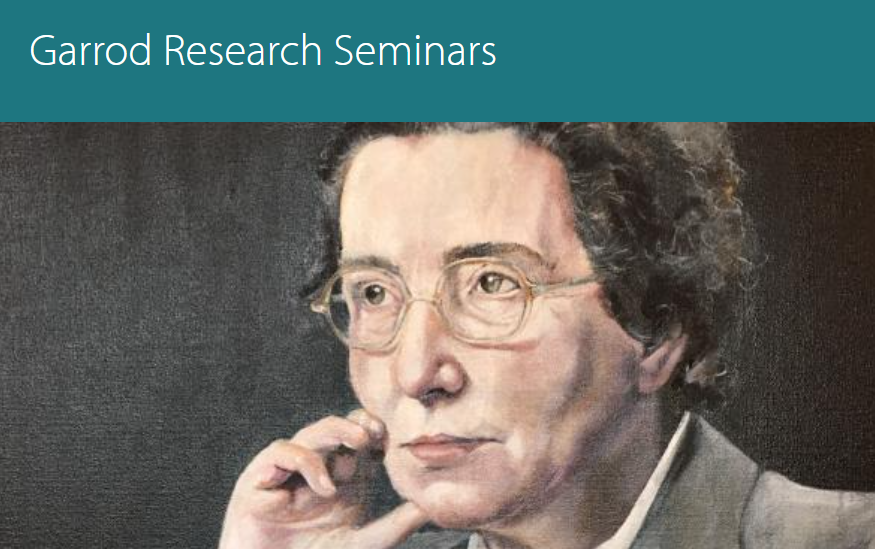 See offical webpage here for registration https://www.arch.cam.ac.uk/events/garrod-research-seminars
See offical webpage here for registration https://www.arch.cam.ac.uk/events/garrod-research-seminars
Inspired by Dorothy Garrod’s passion for interdisciplinary research and commitment to engage local living communities, this series showcases historical ecology contributions to the potentials and challenges of different scales of research and community engagement through a focus on place, epistemologies, resources, and communities on a global scale down to the smallest details. Filmed lectures are found here https://www.youtube.com/c/CambridgeArchaeology
2022 Environmental History Meets Public Policy seminar series
See official webpage here and for registration: https://envhist4p.shh.mpg.de/?page_id=432c
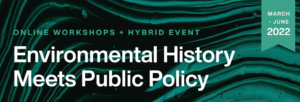 This seminar series is organised by the collective “Historians for Future” and the “International Advisory Panel on Environmental History and Policy”, supported by Centre for Grand Strategy at King’s College London, the Max Planck Institute for the Science of Human History, and Dickinson College, Pennsylvania. In the debate series environmental history practitioners meets and debates with representatives from science and policy aiming to engage
This seminar series is organised by the collective “Historians for Future” and the “International Advisory Panel on Environmental History and Policy”, supported by Centre for Grand Strategy at King’s College London, the Max Planck Institute for the Science of Human History, and Dickinson College, Pennsylvania. In the debate series environmental history practitioners meets and debates with representatives from science and policy aiming to engage
in the policy making process and to make connections between environmental history and policy. Upcoming events:
- 22 March Introduction to Science for Policy: Chloe Hill, Policy Officer, European Geosciences Union
- 5 April Science for Policy Communication: Vitalba Crivello, Policy Analyst at the European Science-Media Hub
- 19 April Engaging with government: history as part of policy making: Prof Philip Murphy, History and Policy Group, UK
- 3 May The key role of the European Parliament Intergroup on ‘Climate Change, Biodiversity & Sustainable Development’ in bridging the
science-policy nexus: Ilias Grampas, Deputy Director, European Bureau for Conservation and Development (EBCD) - 17 May Science for policy ecosystems in the EU and its Member States: policies, institutions, and competences: Kristian Krieger, Policy Analyst, Unit: “Knowledge for Policy: Concepts and Methods”, European Commission, Joint Research Centre
- 31 May Mapping science-for-policy ecosystems in Europe and Germany: Irene Broer, Leibnitz Institute for Media Research – Hans Bredow Institute,
German.
See official flier and registration here
2022 Tipping Elements
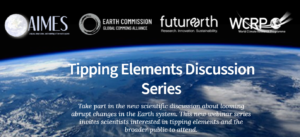 The Tipping points series is organised by AIMES in collaboration with Future Earth, the Earth Commission and the WCRP. In the series researchers discuss a brupt changes in different Earth systems – from the Oceans, to forests to permafrost regions and ice sheets. Can we find a common language and toolbox to define and understand how and when systems crosses thresholds causing negative and irreversible changes – or its tipping points. What are the elements of tipping points, irreversability, and abrupt changes in our Earth systems and where should we focus our research. Listen to the debates and discussions in the filmed and coming seminars on Tipping Elements
The Tipping points series is organised by AIMES in collaboration with Future Earth, the Earth Commission and the WCRP. In the series researchers discuss a brupt changes in different Earth systems – from the Oceans, to forests to permafrost regions and ice sheets. Can we find a common language and toolbox to define and understand how and when systems crosses thresholds causing negative and irreversible changes – or its tipping points. What are the elements of tipping points, irreversability, and abrupt changes in our Earth systems and where should we focus our research. Listen to the debates and discussions in the filmed and coming seminars on Tipping Elements
2021 For Peat’s Sake
Listen to the researchers in the PAGES working group Carbon in Peat on EArth through Time (C-PEAT) explain the potential of peatlands as environmental and climate records, and also as carbon sinks. Listen to the past present and future of peatlands in the open Spotify series
2021 Human Traces
The PAGES Human Traces working group was launched in January 2021, and on deep-time human impacts prior to the period that have been suggested to the named the Anthropocene. In a series of filmed workshops and lectures, researchers discuss how human traces are manifest in different parts of the world, and in different stratigraphic records and how to define them. Find the lectures here
2021 Rai Anthropology and Conservation
The formal conference page is found here
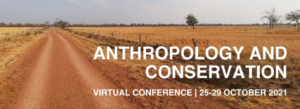 The Royal Anthropological Institute held a conference on Anthropology and Conservation 25-29 October 2021. The aim of the conference was simple: it is increasingly recognised that conservation can only be properly achieved with Indigenous Peoples, in full recognition of their rights. A few sessions at RAI 2020 were dedicated to the long term studies and biocultural heritage, see program. Below are links to the filmed talks from some of the many relevant sessions.
The Royal Anthropological Institute held a conference on Anthropology and Conservation 25-29 October 2021. The aim of the conference was simple: it is increasingly recognised that conservation can only be properly achieved with Indigenous Peoples, in full recognition of their rights. A few sessions at RAI 2020 were dedicated to the long term studies and biocultural heritage, see program. Below are links to the filmed talks from some of the many relevant sessions.
rai2021 P071: Lessons from the deep past: archaeological approaches to conservation – YouTube
rai2021 P070: Ethnobiologists, Communities, and Collaboration for Conservation – YouTube
rai2021 P043a: Territories of Life: Wellsprings of Biocultural Relationship and Resurgence – YouTube
2121 Earth Archive Congress
 The Earth Archive is a conservation initiative which seeks to scan the planets land surfaces with very high resolution lidar, as an pen source, digital record of the Earth that will reflect the landscape exactly as it was at the time of scanning and preserve this information for future generations. It seeks to combine remote sensing and Lidar to document the Earths surfaces to inform conservation and in face of planetary changes due to climate change. The 2021 inaugural congress was dedicated to the Amazon. The filmed talks and discussions are found here
The Earth Archive is a conservation initiative which seeks to scan the planets land surfaces with very high resolution lidar, as an pen source, digital record of the Earth that will reflect the landscape exactly as it was at the time of scanning and preserve this information for future generations. It seeks to combine remote sensing and Lidar to document the Earths surfaces to inform conservation and in face of planetary changes due to climate change. The 2021 inaugural congress was dedicated to the Amazon. The filmed talks and discussions are found here
LOOPS Workshop Series
The LOOPs workshop series is coordinated by Potsdam institute but coordinated with a number of partners where researches convene to discuss scenario building and modelling, planetary boundaries and transformative change. See the programmes and output from previous years LOOPs workshops
